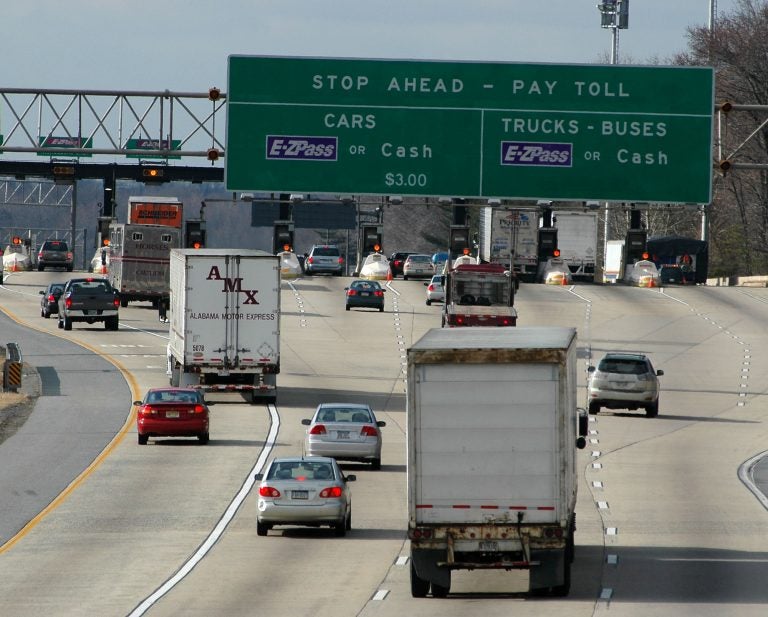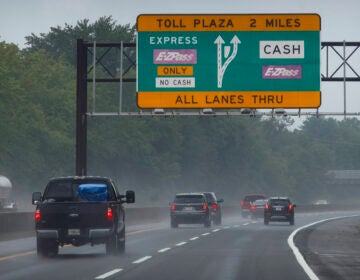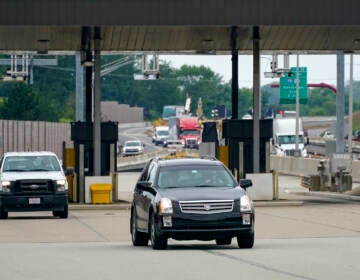Delaware offers toll violators amnesty in effort to recoup millions in lost revenue
Toll violators owe Delaware nearly $150 million in missed toll payments and fines from over the past six-and-a-half years.

File photo: Vehicles arrive at the Delaware toll plaza on I-95 in Newark, Del. (Pat Crowe II/AP)
Every year, Delaware collects more than $190 million from more than 70 million toll transactions at the I-95 toll plaza near the Maryland state line and State Route 1, which connects 95 to Delaware’s beaches. But about 1% of those tolls go unpaid.
In recent years, drivers failing to pay those tolls have racked up more than $143 million in unpaid tolls and fines. The state has typically been successful in collecting little more than 8% of what it’s owed over the past few years.
Now, in an effort to bring in more of what’s owed for unpaid tolls and fees, DelDOT is offering a three-month amnesty period to allow drivers to pay their toll violations with a drastically reduced fine to clear their record.
“Toll amnesty is designed to reduce the open violations that are being tracked and monitored and just settle all the accounts that are possible,” said Marinah Carver, communications chief for the Delaware DMV. “We’re hoping to get more participation and voluntary fine payments or account settling. It’s certainly intended as a mutually beneficial program for both our account-holders and the state.”
Typically, a one-time toll violation costs a driver $51, or $88.50 if not paid within 42 days.
That fine is made up of a $25 administration fee and a $25 civil fine. Starting in 2017, the state added a $10 fee for the Volunteer Ambulance Company Fund and a $15 fee for the Fund to Combat Violent Crimes to every violation. Another civil fine of $12.50 is also tacked on to any violation not paid within 42 days.
With the extra fines and fees, drivers with multiple violations could see the amount they owe add up to hundreds or even thousands of dollars.
Under the amnesty program, those fees would be drastically reduced for drivers based on how many violations they owe. Drivers with ten or fewer violations would have to pay the original toll amount plus an amnesty fee of just $60.
The $60 amnesty fee gradually increases depending on the number of outstanding violations. Someone with more than 100 violations would have to pay just $285. The amnesty fee for more than 250 violations is $510. The top amnesty fee for someone with more than 650 violations is $1,100.
That means someone with nine violations, who would normally owe nearly $800 in fines and fees, can clear their debt by paying just $69. Further up the violations chart, someone with 496 violations would usually owe more than $43,000. Under the amnesty program, they can erase that debt for just $1,306.
“The toll amnesty fee is again such a small fraction of larger amounts that would be due,” Carver said. “I really would encourage everyone to take advantage of the program while it’s here because it will not be offered again.”
DelDOT records show more than 620,000 vehicles have committed ten or fewer violations. Another 20,000 cars have more than ten toll violations, some a lot more.
Violators will be sent a letter this month to notify them of the program. They’ll have 60 days to take part. The amnesty balance must be paid by December 31.
The state expects to bring in at least $1.7 million as a result of the program.

Get daily updates from WHYY News!
WHYY is your source for fact-based, in-depth journalism and information. As a nonprofit organization, we rely on financial support from readers like you. Please give today.







